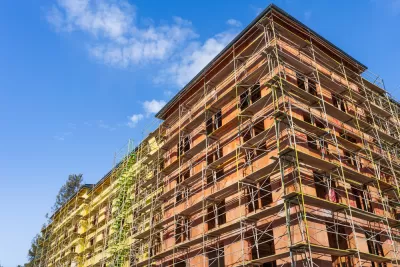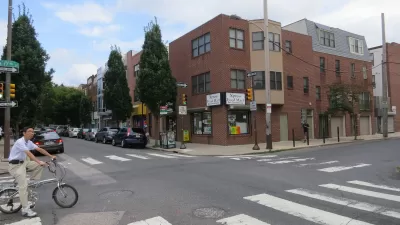A new study by researchers at the Urban Institute finds new evidence that upzoning produces housing supply and reduces costs, while downzoning does the opposite.

A study published recently in the journal Urban Studies has produced “the first cross-city panel dataset of land-use reforms” to quantify the impact on housing supply and rents.
The study is behind a paywall at the journal, but from the study’s abstract, we can see that the study used machine-learning algorithms to search U.S. newspaper articles between 2000 and 2019, merging the data with U.S. Postal Service and Census data.
“We find that reforms that loosen restrictions are associated with a statistically significant 0.8% increase in housing supply within three to nine years of reform passage, accounting for new and existing stock,” according to the abstract.
The Urban Institute also wrote up the study for an article on their own website, providing further insight into the study’s methodology and findings. For example, the resulting increase in housing supply is greater at the higher end of the market, and the research finds “no statistically significant evidence that additional lower-cost units became available or became less expensive in the years following reforms.”
Still, the benefits still manage to spread to other parts of the market, according to the study: “impacts are positive across the affordability spectrum and we cannot rule out that impacts are equivalent across different income segments.”
The study also found the converse to be true: “reforms that increase land-use restrictions and lower allowed densities are associated with increased median rents and a reduction in units affordable to middle-income renters.”
The new research is the latest in an ongoing debate, central to the political debate happening between pro-development political forces (i.e., YIMBYs) and those opposing developments, including both anti-displacement and neighborhood character protection groups.
FULL STORY: Land-Use Reforms and Housing Costs

Maui's Vacation Rental Debate Turns Ugly
Verbal attacks, misinformation campaigns and fistfights plague a high-stakes debate to convert thousands of vacation rentals into long-term housing.

Planetizen Federal Action Tracker
A weekly monitor of how Trump’s orders and actions are impacting planners and planning in America.

Chicago’s Ghost Rails
Just beneath the surface of the modern city lie the remnants of its expansive early 20th-century streetcar system.

Bend, Oregon Zoning Reforms Prioritize Small-Scale Housing
The city altered its zoning code to allow multi-family housing and eliminated parking mandates citywide.

Amtrak Cutting Jobs, Funding to High-Speed Rail
The agency plans to cut 10 percent of its workforce and has confirmed it will not fund new high-speed rail projects.

LA Denies Basic Services to Unhoused Residents
The city has repeatedly failed to respond to requests for trash pickup at encampment sites, and eliminated a program that provided mobile showers and toilets.
Urban Design for Planners 1: Software Tools
This six-course series explores essential urban design concepts using open source software and equips planners with the tools they need to participate fully in the urban design process.
Planning for Universal Design
Learn the tools for implementing Universal Design in planning regulations.
planning NEXT
Appalachian Highlands Housing Partners
Mpact (founded as Rail~Volution)
City of Camden Redevelopment Agency
City of Astoria
City of Portland
City of Laramie





























